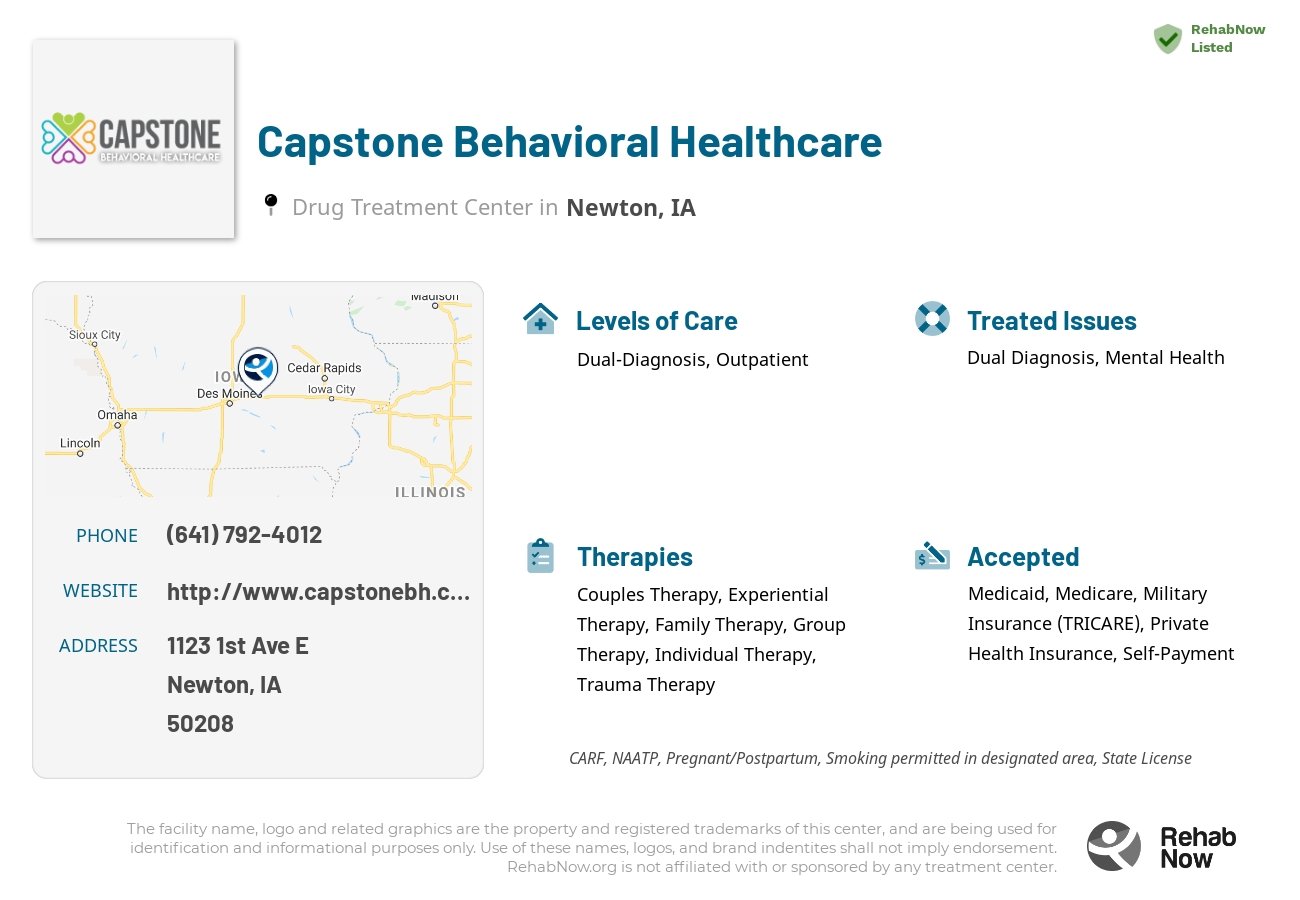Capstone Behavioral Healthcare
Drug Rehab Center in Newton, Iowa
Capstone Behavioral Healthcare is an experienced and well-respected Addiction Treatment Facility located in Newton, IA that offers comprehensive evidence-based approaches tailored to each individual's needs, including Dual Diagnosis, Outpatient and Intervention services, as well as accepting most private health insurance plans to assist in providing personalized care for sustainable sobriety.
About Capstone Behavioral Healthcare in Iowa
Capstone Behavioral Healthcare is an addiction treatment facility in Newton, Iowa. Founded in 1968, it has years of experience in providing vital support to individuals suffering from dual diagnosis, drug addiction, and mental health issues. Capstone Behavioral Healthcare offers various levels of care, including dual-diagnosis treatment for those facing both addiction and mental health challenges. As an outpatient facility, it ensures that individuals can access the needed services while still living at home and maintaining their daily routines. Capstone Behavioral Healthcare accepts private health insurance, facilitating accessibility to their high-quality treatment options.
Capstone Behavioral Healthcare utilizes a comprehensive and personalized approach to address addiction and substance abuse issues. They offer a range of services tailored to individual needs rather than a one-size-fits-all approach. Their treatment methods include evidence-based therapies such as cognitive-behavioral therapy (CBT) and dialectical behavior therapy (DBT), aimed at promoting stability and behavioral changes. Additionally, the facility provides specialized care for dual diagnosis cases where combined mental health and substance abuse treatments are offered in an integrated manner. Their experienced staff helps patients identify thought patterns or underlying reasons contributing to substance abuse, making a positive impact on their recovery journey.
Genders
Ages
Modality
Additional
Conditions and Issues Treated
Levels of Care Offered
This center offers a variety of custom treatment tailored to individual recovery. Currently available are Dual-Diagnosis, Intervention, Outpatient, with additional therapies available as listed below.
“Outpatient treatment is ideal for those who have a lower intensity addiction. It’s also suitable for those with a supportive environment and those on a tight budget.
Outpatient treatment can be considered the lowest intensity level of addiction treatment. It is ideal for early phase addiction or lower intensity addictions. It may involve weekly sessions instead of daily. Peer group support, 12-step programs, and individual counseling may still be used and anti-addiction medication.
Drug rehab intervention aims to make sure patients understand the risks of their addiction and possible outcomes. They must learn how their addiction affects those around them and allow a therapy session to help move past the physical symptoms. They often include psychotherapy or behavioral therapy, group therapy, family counseling, and peer support.
Therapies & Programs
No single treatment works for all addicts; therefore, the goal of treatment and therapy should be to find what works best for each individual. Some people requiring addiction treatment may only need a few weeks of inpatient care. Others will require long-term residential care. Tolerance and withdrawal levels vary from person to person and thus affect the intensity of the treatment needed.
If an individualized approach to treatment and therapy is not offered, addicts may fail to reap benefits from their efforts. Professionals must customize plans according to their patient’s needs, limitations, and strengths. The goal of all forms of addiction treatment should be for addicts to find healthy ways to cope with their addiction and its underlying causes.
Couples therapy for drug addiction is a unique form of therapy that allows family members to work through the emotional issues of their loved one’s addiction together. Family members can support each other while learning how to cope with the addiction and encourage healthy changes.
Accordingly, couples therapy for drug addiction is designed for an addict and their significant other or spouse. The two will work with a therapist to learn how the addiction affects themselves and the relationship and how to break the negative patterns of behavior that may have developed.
Drug addiction can destroy a person’s life, as well as their family and friends. The loss of one’s ability to choose how to live and behave often leads the addict into depression, anger, guilt, and many emotional problems.
The therapies usually include siblings, children, and parents who are involved in their daily lives. These sessions are vital because they address past issues that may have hampered an addict’s or alcoholic’s recovery and provide support at a crucial time!
One of the most critical aspects of family therapy is helping addicts’ loved ones see their situation in a new light. It’s also one of the most challenging things a family can do when a loved one struggles with addiction or alcoholism.
Group therapy is held in a safe, controlled setting where patients can feel comfortable sharing their struggles and gaining perspective through shared conversations. It takes place in a group rather than one on one to prevent feelings of isolation or being unique in their situation while creating an environment for addicts at Capstone Behavioral Healthcare to develop fellowship, accountability, and support. Group therapy is an important tool in recovery that prevents cravings that prompt a return to active addiction.
This type of therapy involves the use of a variety of therapeutic techniques to help addicts recover from past traumas that might have triggered their substance abuse. During these sessions, therapists will work with the addict to address painful memories and learn how to cope effectively with stressors as they arise.
During these types of sessions, therapists will typically focus on three main goals:
- Identifying and expressing painful emotions associated with past traumas.
- Reducing the effects of stress on an addict’s life by developing more effective coping mechanisms.
- Developing healthy ways of thinking about stressful situations that can help addicts avoid substance abuse issues in the future.
This type of therapy is typically used in conjunction with other types of addiction treatment services. By identifying and dealing with the root cause of addiction, most addicts can overcome their cravings and prevent relapse once they leave rehab.
Many different types of addiction treatment services exist to help addicts safely get sober, but it’s important for recovering individuals to find a therapist or support group that will help them address the root cause of their addiction.
Cognitive-behavioral therapy is a talking-based method that helps people struggling with addiction replace destructive behaviors with healthier ones. CBT also helps them identify the underlying thoughts and beliefs that cause these behaviors in the first place and ways to control those thoughts and feelings. It can be administered as a holistic therapy or as part of combination therapy and—as opposed to turning to drugs and alcohol—helps addicts learn how to respond to negative thoughts instead.
Patient Experience
Experiential Therapy at Capstone Behavioral Healthcare
Experiential Therapy is used by drug treatment facilities to treat substance abuse. This treatment is clinically proven to help addicts in detoxification by allowing them to release emotions in a safe environment. The treatment process involves addicts painting their feelings and releasing them on a canvas.
One of the most popular forms of experiential therapy is known as LPE – Love, Peace, and Equilibrium. Amy Gumowitz developed this treatment in 1992. By implementing her philosophy of “reality therapy” into the treatment, Gumowitz’s results were outstanding. Once her success was validated by those she had been helping, she decided to open her treatment center. Although Gumowitz passed away in 2007, her contribution to the addiction recovery remains effective, and better yet, it is 100% self-sufficient.
Payment Options Accepted
For specific insurance or payment methods please contact us.
Is your insurance accepted?
Ask an expert, call (888) 674-0062
Capstone Behavioral Healthcare Associated Centers
Discover treatment facilities under the same provider.
No items foundLearn More About Capstone Behavioral Healthcare Centers
Additional Details
Specifics, location, and helpful extra information.
Newton, Iowa 50208 Phone Number(641) 792-4012 Meta DetailsUpdated November 25, 2023
Staff Verified
Capstone Behavioral Healthcare Patient Reviews
There are no reviews yet. Be the first one to write one.
Newton, Iowa Addiction Information
Iowa ranks 2nd lowest in the nation for illicit drug use, but 12% of its residents are still using these drugs every single year. Methamphetamines account for more than 90% of all drug-related prison admissions in Iowa. Alcohol is the most widely abused substance in the state, with 23% of residents admitting to heavy drinking.
Newton, Iowa's drug addiction issue is not as severe as in some other areas of the United States, but it remains a significant problem. According to recent statistics, drug addiction is among the leading causes of death in Newton. In addition, drug addiction and abuse can lead to criminal activity, job loss, and health problems. There are many rehabilitation centers in Newton. Some offer inpatient treatment, while others offer outpatient care.
Treatment in Nearby Cities
- Bayard, IA (79.1 mi.)
- Manning, IA (105.5 mi.)
- Iowa City, IA (78.0 mi.)
- Guthrie Center, IA (75.6 mi.)
- Shenandoah, IA (137.6 mi.)
Centers near Capstone Behavioral Healthcare
The facility name, logo and brand are the property and registered trademarks of Capstone Behavioral Healthcare, and are being used for identification and informational purposes only. Use of these names, logos and brands shall not imply endorsement. RehabNow.org is not affiliated with or sponsored by Capstone Behavioral Healthcare.








